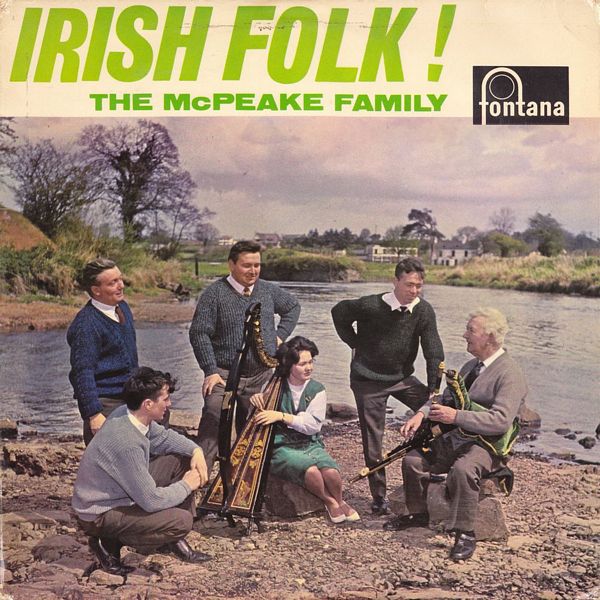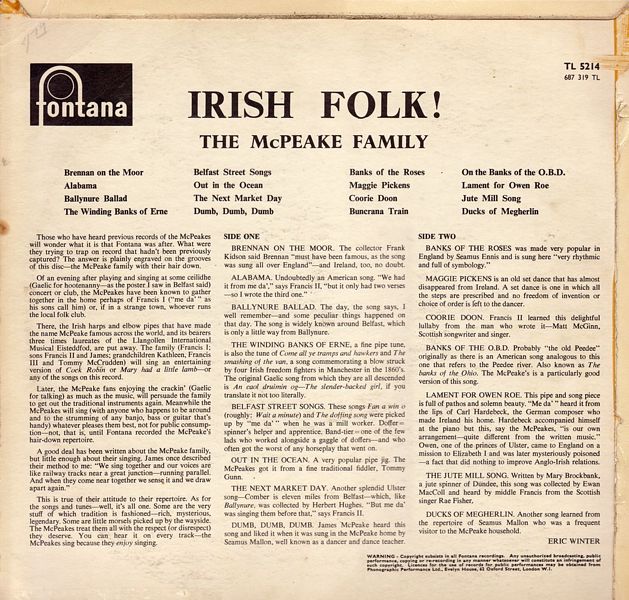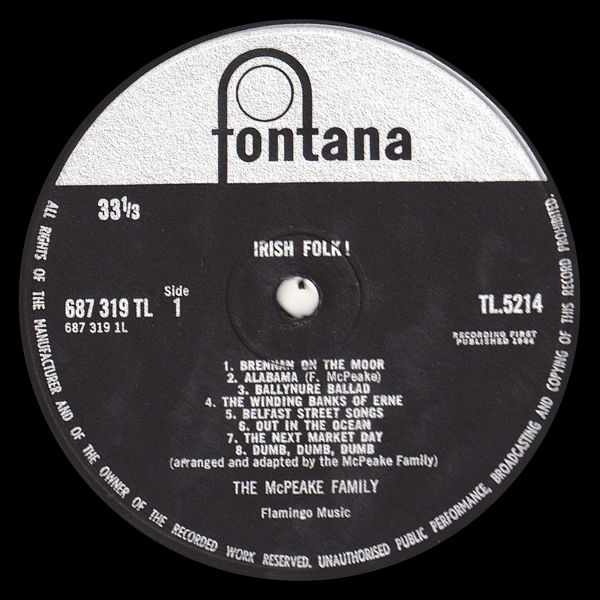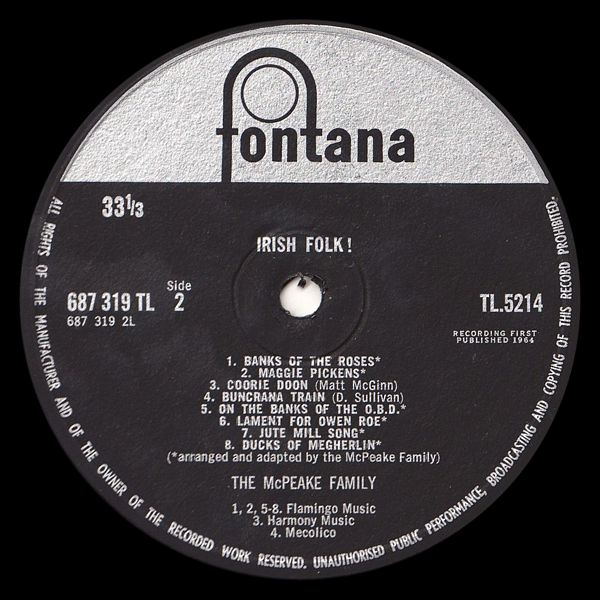
 |



|
Sleeve Notes
Those who have heard previous records of the McPeakes will wonder what it is that Fontana was after. What were they trying to trap on record that hadn't been previously captured? The answer is plainly engraved on the grooves of this disc — the McPeake family with their hair down.
Of an evening after playing and singing at some ceilidhe (Gaelic for hootenanny — as the poster I saw in Belfast said) concert or club, the McPeakes have been known to gather together in the home perhaps of Francis I ("me da'" as his sons call him) or. if in a strange town, whoever runs the local folk club.
There, the Irish harps and elbow pipes that have made the name McPeake famous across the world, and its bearers three times laureates of the Llangollen International Musical Eisteddfod, are put away. The family (Francis I; sons Francis II and James; grandchildren Kathleen, Francis III and Tommy McCrudden) will sing an entertaining version of Cock Robin or Mary had a little lamb — or any of the songs on this record.
Later, the McPeake fans enjoying the crackin' (Gaelic for talking) as much as the music, will persuade the family to get out the traditional instruments again. Meanwhile the McPeakes will sing (with anyone who happens to be around and to the strumming of any banjo, bass or guitar that's handy) whatever pleases them best, not for public consumption — not, that is, until Fontana recorded the McPeake's hair-down repertoire.
A good deal has been written about the McPeake family, but little enough about their singing. James once described their method to me: "We sing together and our voices are like railway tracks near a great junction — running parallel. And when they come near together we sense it and we draw apart again."
This is true of their attitude to their repertoire. As for the songs and tunes — well, it's all one Some are the very stuff of which tradition is fashioned — rich, mysterious, legendary. Some are little morsels picked up by the wayside. The McPeakes treat them all with the respect (or disrespect) they deserve. You can hear it on every track — the McPeakes sing because they enjoy it.
Brennan On the Moor — The collector Frank Kidson said Brennan "must have been famous, as the song was sung ail over England" — and Ireland, too, no doubt.
Alabama — Undoubtedly an American song. "We had it from me da'" says Francis ll, "but it only had two verses — so I wrote a third one."
Ballynure Ballad — The day, the song says, I well remember — and some peculiar things happened on that day. The song is widely known around Belfast, which is only a little way from Ballynure.
The Winding Banks of Erne, a fine pipe tune, is also the tune of Come all ye tramps and hawkers and The smashing of the van. a song commemorating a blow struck by four Irish freedom fighters in Manchester in the 1860's. The original Gaelic song from which they are all descended is An col druimin og — The slender-backed girl, if you translate it not too literally.
Belfast Street Songs — These songs Fan a win o (roughly: Wait a minute) and The doffing song were picked up by "me da' " when he was a mill worker. Doffer — spinner's helper and apprentice. Band-tier = one of the few lads who worked alongside a gaggle of doffers — and who often got the worst of any horseplay that went on.
Out In the Ocean — A very popular pipe jig. The McPeakes got it from a fine traditional fiddler. Tommy Gunn.
The Next Market Day — Another splendid Ulster song — Comber is eleven miles from Belfast — which, like Ballynure, was collected by Herbert Hughes. "But me da* was singing them before that," says Francis II.
Dumb, Dumb, Dumb — James McPeake heard this song and liked it when it was sung in the McPeake home by Seamus Mallon, well known as a dancer and dance teacher.
Banks Of the Roses was made very popular in England by Seamus Ennis and is sung here "very rhythmic and full of symbology."
Maggie Pickens is an old dance that has almost disappeared from Ireland A set dance is one in which all the steps are prescribed, and no freedom of invention or choice of order is left to the dancer.
Coorie Doon — Francis II learned this delightful lullaby from the man who wrote it — Matt McGinn, Scottish songwriter and singer.
Banks Of the O.B.D. — Probably "the old Peedee" originally as there is an American song analogous to this one that refers to the Peedee river. Also known as The banks of the Ohio. The McPeake's is a particularly good version of this song.
Lament For Owen Roe — This pipe and song piece is full of pathos and solemn beauty. "Me da'" heard it from the lips of Carl Hardebeck, the German composer who made Ireland his home. Hardebeck accompanied himself at the piano but this, say McPeakes, "is our own arrangement — quite different from the written music." Owen, one of the princes of Ulster, came to England on a mission to Elizabeth I and was later mysteriously poisoned — a fact that did nothing to improve Anglo-Irish relations.
The Jute Mill Song — Written by Mary Brockband, a jute spinner of Dundee, this was collected by Ewan MacColl and heard by middle Francis from the Scottish singer Rae Fisher.
Ducks Of Megherlin — Another song learned from the repertoire of Seamus Mallon who was a frequent visitor to the McPeake household.
ERIC WINTER
Sleeve Notes — from Introducing …
SONGS & DANCES OF THE TRADITIONAL IRISH CEILIDHE (HOOTENANNY) WITH IRISH HARP AND ELBOW PIPES
Ireland is a country of song, a land in which the lyric spirit has been firmly implanted for hundreds of years now. A huge body of Gaelic folk song extends back over the centuries to the days when the Gaelic civilization flourished and supported a school of bardic poets who performed their verse, to a harp accompaniment before the chieftains and nobles who were their patrons. The body of lyric song begun by those ancient scholar-poets has been so increased over the years by the Irish people, lettered and unlettered, that Ireland must be considered a vast treasure-house of song, the folk poetry of its people among the most abundant and warmly lyrical of any country in the western world. The beauty and charm of Irish music has long been universally recognized, as has the equal beauty of the verse to which that music has been set. If the tradition of Gaelic song is a long one, it is a living, breathing one as well, as this charming and infectiously exuberant recording bears delightful witness.
Even in a country that celebrates song as perhaps no other does, the McPeake Family of Belfast is held in special awe, occupies a special place in the hearts of Irish people for its undisputed mastery of traditional Gaelic folk music, both vocal and instrumental. The McPeakes are truly a musical family: From singing and playing traditional uillean pipes Irish bagpipes) and Irish harp around their hearth fire, the family has gone on to achieve international fame. They have toured England, Europe and, most recently, the United States and have thrice garnered first place laurels at the Llangolen International Musical Eisteddfod in Wales for their performance of traditional music.
Patriarch and guiding spirit of the musical clan is 80-year-old Francis McPeake Sr., who as a young child in County Derry began to take up the musical traditions of his forebears. After playing in a family flute band at 11, he began studying the old traditional uillean pipes with a blind piper, and became so proficient on them that he won first prize at the 1912 Dublin piping competitions. He passed his love of the old music on to his sons — Francis Jr., who, like his father, plays the pipes, and James, who took up the Irish harp, teaching himself to play the old instrument.
This delightfully unique and musically ingratiating trio are both the joy and consternation of the folklorist: a joy because of the refreshing and exuberant music they make, but a consternation because there is no tradition in Ireland of pipes being used to accompany singing. The bagpipes traditionally were used as solo instruments to provide music for dancing. Tradition or no, however, the McPeakes stuck to their guns — or, rather, their pipes — and in their informal hearthside music sessions fashioned the warm, blithe, joyous and delightfully untraditional Irish folk song heard within. And earned the praise of their neighbors and countrymen as a result.
Folk music never stands still; it is as ever-changing as the people who make it and keep it alive. It was this process of change that prompted the three McPeakes to use their voices and instruments as they do, and it is this same process that brought the latest wave of McPeakes, the grandchildren of Frank Sr., with their new songs (Alabama is a good example) and instruments (guitar, banjo, accordion) into the family group. This third generation of McPeakes consists of Kathleen, Francis III and Tommy McCrudden, and they bring the fresh, brash enthusiasm of youth to the performance of the old songs.
The combination of the two — the old traditional ways and the vitality and spontaneity of the new folksong styles of the grandchildren — makes for a heady, exhilarating music that is at once both traditionally oriented and as exciting and familiar as today. This family of tradition breakers is creating a new, dynamic tradition of Irish song and, happily, we are fortunate enough to share in the excitement of that creation.